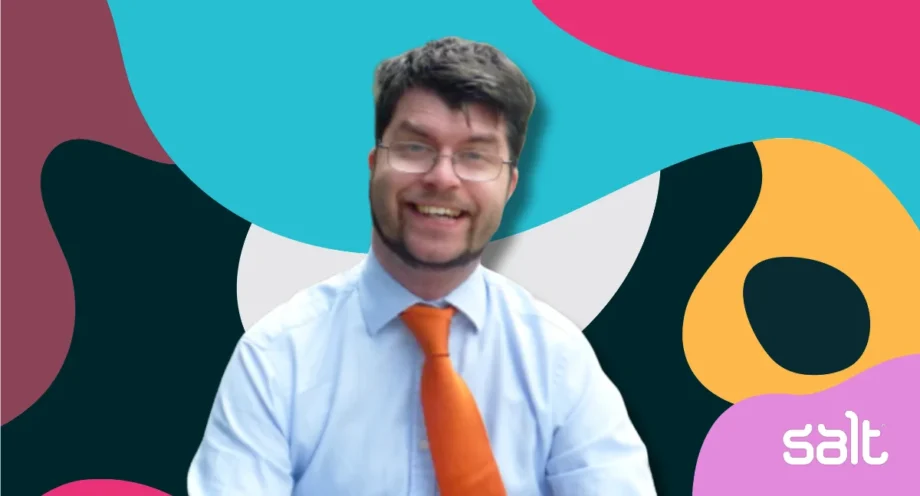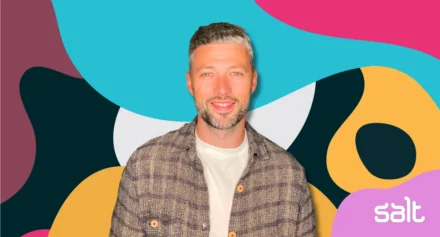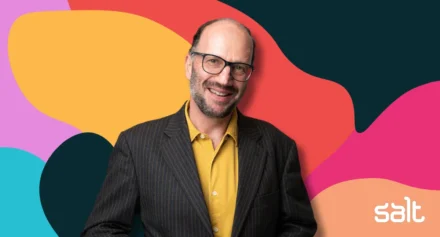Virtual assistance empowering neurodivergents with James Cleves
James Cleves, Autistic Founder and VA, has a mission to uplift other Neurodivergents to achieve their dreams! His story and insights into hiring will inspire you.

Diagnosed with autism at 10 years old, James Cleves was out of paid work until he paid himself his first paycheck. His mission is now empowering and uplifting other Neurodivergents through his business CleverVA, a virtual assistance service. Here’s his story.
Listen to our full interview with James on the Creating Futures by Salt podcast – or read some of our favourite outtakes below!
Discover how virtual assistance services offer needed flexibility and support for both Neurodivergent entrepreneurs and Neurodivergent candidates alike! Hear about James’ journey as an Autistic entrepreneur, his lived experience interviewing with disabilities, his insights on inclusive hiring practices for businesses, and his vision for empowering the Neurodivergent community now and in the future.
Introducing James
I’m James Cleves. I’m the founder of CleverVA. Our primary mission is to support and encourage as many neurodivergent individuals as possible and tailor support to their individual needs.
What is virtual assistance?
Virtual assistance means that you could be based anywhere, essentially.
I have clients based in North America, and I’ve got a client who’s based in Zurich, Switzerland.
The flexibility of virtual assistance is so freeing, especially sole traders and micro businesses, as it means that they don’t have the headache of payroll and taxation because you’re not having to pay a full-time wage. You just pay for the time and services that you need there and then.
What do you wish more people knew about Autism?
It’s going to sound very corny and cliché, but when you’ve met one Autistic person, you’ve only met one Autistic person.
When you get a diagnosis for something like a heart condition, you’re often grouped together with others with the same diagnosis as it manifests in a similar way.
But when it comes to something neurological, such as Autism, it manifests itself so differently. For instance, one of my oldest friends, we went to primary school together, we on paper both have the same diagnosis, but it has manifested in both of us is totally different way.
Everyone is an individual. It’s more important to remember when you’re dealing with someone who has a neurological condition such as Autism. We are individuals and once you’ve had experience of one, don’t think that you’ve had experience of us all.
We are all individuals and it manifests itself totally differently in each and every one of us.
What has been your experience in the world of work?
I find this question quite comical actually! I will answer it in two ways: my paid experience of work versus my voluntary experience of work.
My paid experience of work prior to starting CleverVA doesn’t really exist.
I have submitted my CV, had interviews, been shortlisted, been down to the last two, time and time again. But even in the UK where we have the Equality Act of 2010, and the two-tick system which guarantees disabled people, such as myself, an interview, I’ve never managed to gain a paid job.
On the other hand, I’ve had work experience within the voluntary world. I’ve worked in the third sector for a good number of years, during and after University, and all the people I worked with were wonderful. They really built an understanding of my Autism and my other disabilities and health conditions. So, they were able to work well with me.
One of my proudest moments was actually paying myself, because essentially it was my first ever paycheck. I might do something silly one day and actually frame a copy of that bank transfer as a wee memento of the first paycheck I ever received.
Unfortunately, less than 20% of Autistic people are employed. And if you think of how much that other 80%, which I used to be part of, could contribute to society if we were in work, we managed to get how much more productive. We could be if we were all in jobs and contributing to society.
How can employers be more inclusive of Autistic and Neurodivergent candidates?
When businesses are looking to employ Neurodivergent people, they need to look at the full plethora of experience. We’re not all the same. It’s important to understand that. Each of us needs different things.
When I take on any client, I don’t cookie-cutter my approach. I talk to each and every one of my clients when they come for the onboarding and their initial discovery call, to get to know them and understand what they need. I then tailor whatever package they need to what best suits them.
My message to hiring managers around the world is: talk to us. We are open to the conversation. We’re not scary. You’re the scary ones to us. So please just open up that communication.
Some assumptions and biases need to be challenged that impact some Neurodivergent people, and there are organisations out there who can help with training for your staff to understand these better.
For example, so many of us are taught that in an interview it’s important to maintain eye contact – and that body language is important. But for some of us Neurodivergents, including me, we find that really hard. It can be incredibly stressful and uncomfortable and could set off an anxiety attack. By avoiding eye contact, they’re not being rude and they’re not uninterested in the interview! They’re engaging and keeping themselves regulated in the moment. Typically, I try to find a point behind someone’s head and look above their head. Others might sit with their hands in their lap, looking down.
Top tips for making a workplace more Neuroinclusive:
- Train! Invest in Neurodiversity recruitment training to build more understanding, change what interviewers are looking for and interrupt any biases they have.
- Represent! Invite a Neurodiverse person to sit on the interview panel – they can help challenge biases and might set the candidate at ease.
- Talk! Start conversations and learn more about Neurodiverse candidates or employees as individuals – what do they need as a person?
What has your experience been like being so open on social media?
I was scared at first to be as open. They say you should always hold something back, but I tried to show I am a person and I am valuable and I’m an Autistic individual.
I struggle, we all struggle, sharing personal things. I shared some stories this year about getting married and how you can make a wedding Neuroinclusive and the amount of love and support it got was mind-blowing. The post just blew up and I was shocked. This is meant to be a business platform, but yeah, it was lovely to see people being so supportive and receiving congratulatory messages.
Until starting CleverVA, I’ve been very sceptical of social media. I had certain social media accounts but only really had friends and family on there. To connect to the professional world, I had to open up essentially. By doing that, I feel it’s made me more approachable.
My clients find it very refreshing, and it makes me more of a person that they can relate to and have an open and frank conversation with. So, it’s actually put them at ease when they’ve been in the market looking for a virtual assistant because they think, “If he’s been open and honest with us, why can’t I do the same with him and get the support I need?”
What’s your goal for CleverVA?
I want CleverVA to eventually be a one-stop-shop for virtual assistant services: from web design to copywriting. I want to employ other neurodivergent individuals. I’m sorry, but I want my team to be Neurospicy, in all shapes and sizes!
I also want to be able to offer opportunities and training to Neurodivergent individuals out there, employing them as VAs but also training them and allowing them the chance to be working alongside professionals in their field. Whether it’s training on Canva or InDesign, or learning how to write the best copy or do search engine optimisation, I want to help them learn these skills. Because with the digital economy constantly growing, these are things that we’re all going to need. Hopefully, it will open up employment opportunities.
The opportunities and potential are endless. Just by giving the right support and the right encouragement to people at the right time, they can achieve anything.
It doesn’t matter how small your dream is, it could be as small as a mustard seed or it could be as big as K2, I’m never scared to dream. I want to support as many people as I possibly can! I feel as part of the human race we should all be supporting and encouraging each other. And I just want to pay that forward.
Find out more about James and CleverVA
Connect with me or follow me on social media to keep up with what I’m doing with CleverVA! I’m on LinkedIn.
Want some support with your business? CleverVA can help with that! Find out more about my packages.
Looking for some motivation? I send out a weekly newsletter to give you a tip or strategy for the week ahead. Sign up here!

